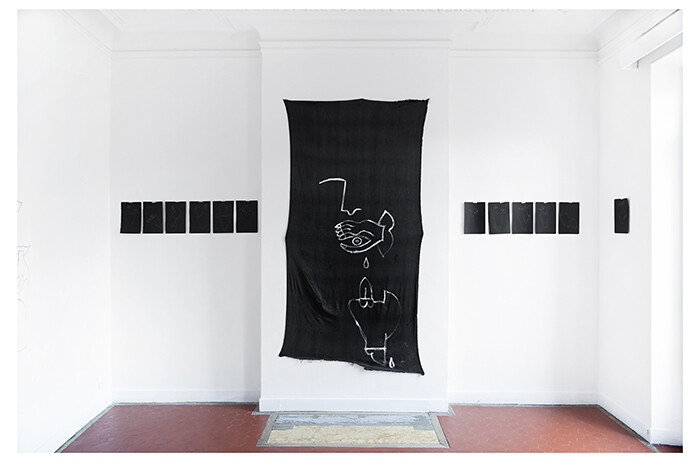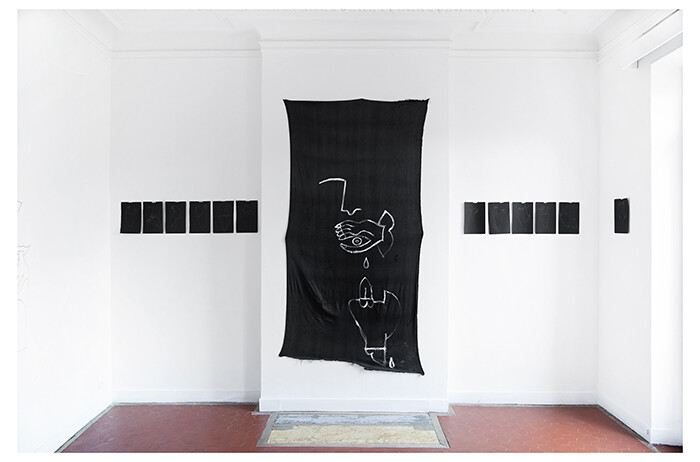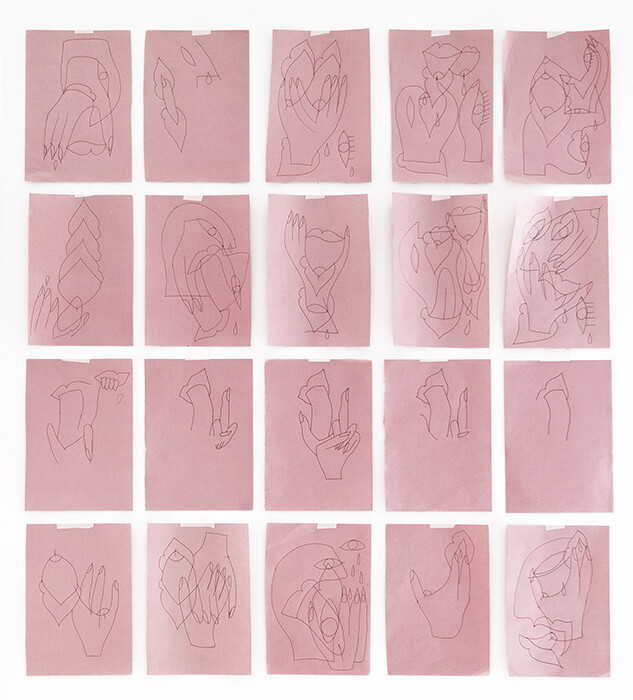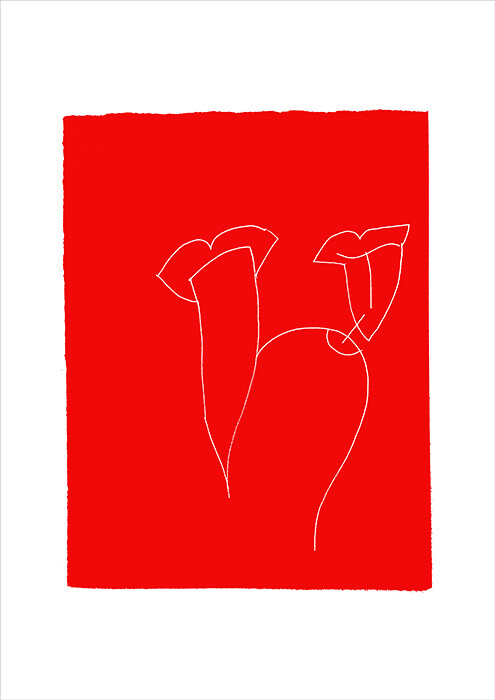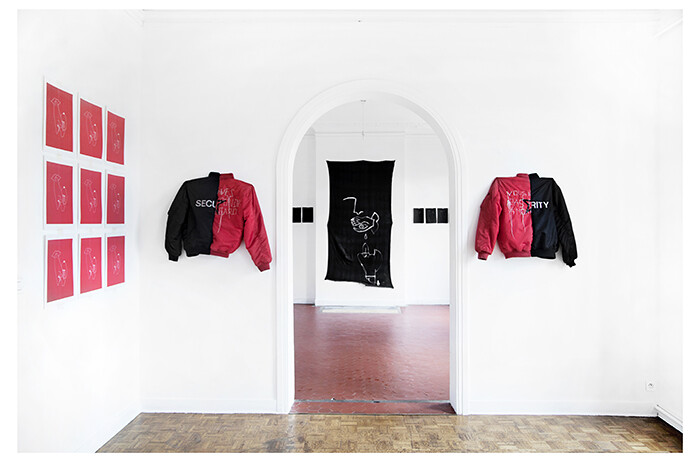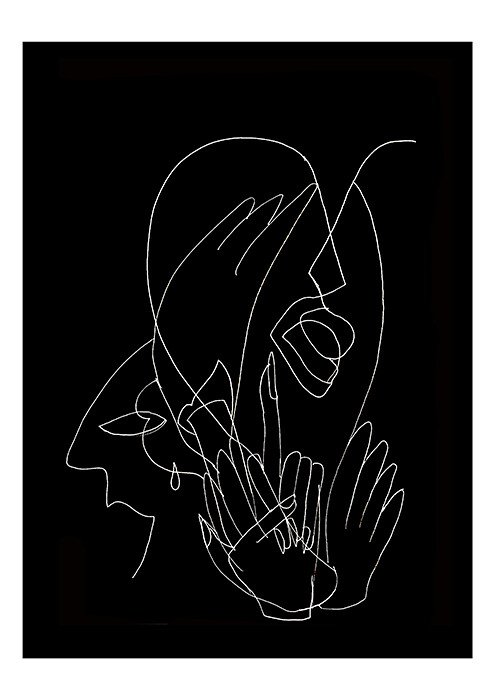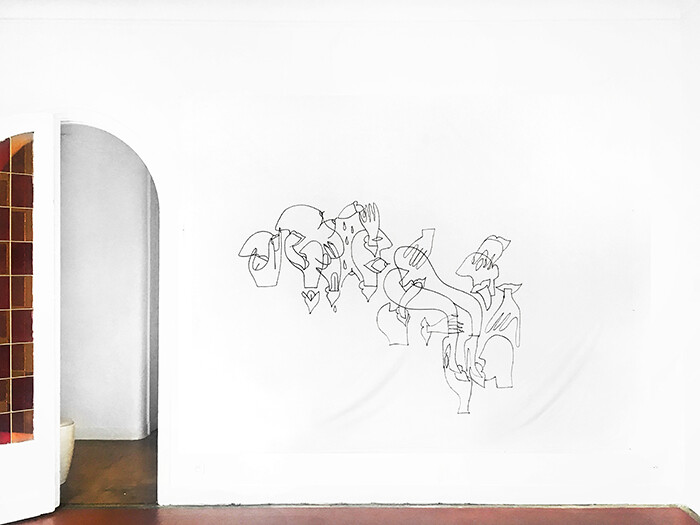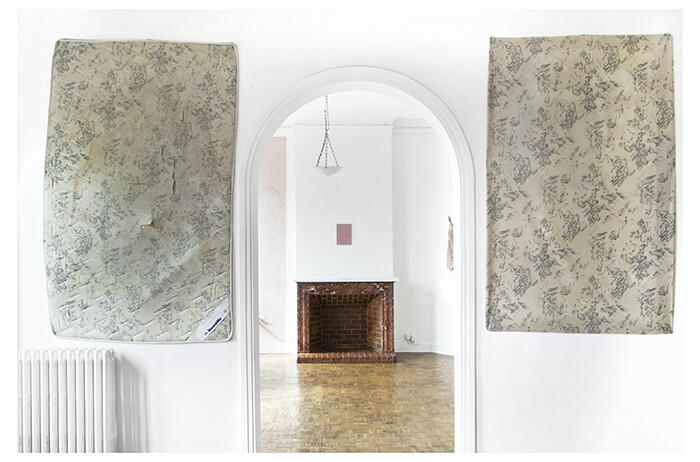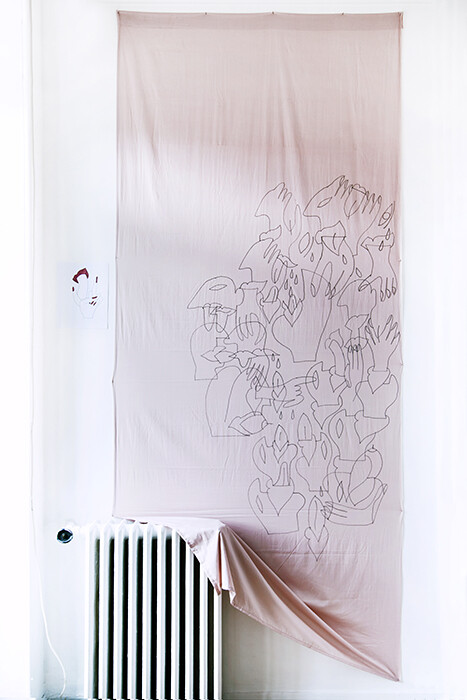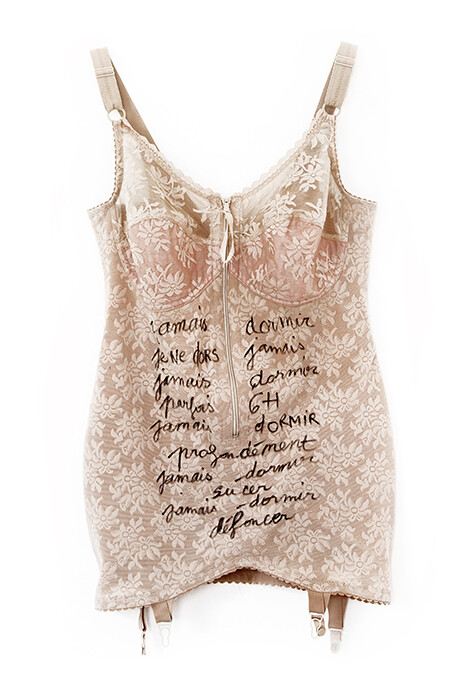Vava Dudu’s “Vertige Profonde” at Marseille’s Salon du Salon is visually balanced to the point of stillness. The solo show occupies two adjoining rooms on the third floor of a spacious old bourgeois apartment on l’Avenue du Prado, a wide boulevard radiating out of the city center towards the south and into the city’s richer neighborhoods. Grids of pen-and-ink drawings on notebook paper and intertwining compositions scrawled across thin cotton sheets can do nothing—in the sense that desire is unstable and the drawings are about the movement of the body with another—to disturb the exhibition’s equilibrium.
Small mounds stand out invitingly, sketched with slim lines, tucked inside abstract folds. Holes weep as the silhouettes of fingers slide into them. Disembodied breasts drip, lightly cupped by large hands. What kind of soft volume is that finger spreading beneath it, with its insistence on the vertical axis? “Does it matter?” Dudu’s drawings ask. There is nothing balanced about desire, and yet here it is, stilled, caught on rectangles of paper and cloth, so that one can focus on the implications of just that one mouth and the hand that is tangled around whatever it is sucking on.
“Vertige Profonde” translates as intense or deep vertigo, but in the word profonde there is also the suggestion of some underlying phenomenon, as though vertigo were at the foundation of sexual play. The spinning, decentering center of human experience. As Dudu’s iconographic drawings spill down a rosé sheet pinned to the wall, its surface tension breaking only to accommodate a wrought-iron radiator, the myriad overlapping hands and faces figure the dizziness of the body caught in time with another body. The fact that the exhibition as a whole is still, nevertheless, results from the fact that there is nothing abject about desire as Dudu envisions it. There is violence, a lack of orientation and of any ultimate climax in her work, but it does not speak to what happens to the body before or after vertigo; there is no motive and no collapse.
Dudu’s position is uncategorizable. She is an iconoclast whose vision is governed by irreverence and intuitive play. As a fashion stylist, she made corsets for Jean-Paul Gautier, and then started her own line of accessories using ancient beads. With Fabrice Lorrain, she won the prestigious ANDAM Fashion Award in 2001 for a series of performances in the late 1990s and early 2000s. Dudu and Lorrain’s innovation was to repurpose used clothing, amalgamating existing garments and shunning the fantasy of infinite newness. Together they made pieces for Lady Gaga, Björk, and Cat Power. In 2003, Vava founded La Chatte, French for pussy, a queer electro-rock-punk-pop band, for which she creates elaborate costumes like the one she wore for an interview at La Gaîté Lyrique in Paris when their album Crash Ocean was released in 2014. Her psychedelic stockings are reminiscent of Dr. Seuss’s early palette. These are topped by a giant, bright yellow puffer jacket. Two wilted plastic white women’s heads are spilling from the jacket’s collar on either side of Dudu’s own.1
Phillippe Munda has run Salon du Salon for four years at its current location, which is also where he hosts production residencies, runs a limited-edition art-book press, and lives full-time. Part commercial gallery, part project space, part domestic interior, it is the kind of hybrid institution that characterizes Marseille’s art scene. Its architecture is key to its conceptual equilibrium: bourgeois French apartments, such as Munda’s, have an internalized separation of public and private. With its cavernous ceilings and French windows giving onto a shallow balcony that skirts the entire building, Salon du Salon is intimate without succumbing to informality. This space was designed to encompass social masquerade at the scale of the body, and so it breathes, unlike its massive post-industrial cousin, the white cube.
Two rooms separate two very distinct moods in Dudu’s work: one rosé and the other red and black. On either side of the arched doorway that separates these spaces, Dudu and Munda have hung a pair of jackets that are among the few works Dudu did not create in situ as part of her residency. A red jacket and a black jacket were halved and then sown together with the opposite half of its twin. The word “security” stitched into the back of the black jacket is thus split, as is the black star against a red ground on the other. Across both is stitched the phrase, “vous n’avez pas répondu à mon regard” (you did not respond to my gaze) but with the formal vous address. Dudu’s embroidered accusation is not addressed to a lover, in other words. I read the security jacket as the uniform of mercenary authority and the starred jacket as the representative of some mixture of punk and old-school communism, another kind of order, and only slightly less authoritarian than its twin.
If there is no collapse in “Vertige Profonde,” there is nevertheless an admission of the failure of systems—both “security systems” and ideological systems of resistance to their authority—to suture all subjects equally within the fabric of society, into order or counter-order. This failure on the part of the uniformed to respond to the gaze of an Other is the violent pair to desire. It is the other center-less center of society. The refusal to be ethical—the refusal to look—is ultimately the refusal to be undone by the possibility of another’s desire.
“Interview de La Chatte : miaulements monstres entre concert et catwalk,” La Gaîté lyrique (February 11, 2013), https://vimeo.com/59410598.
